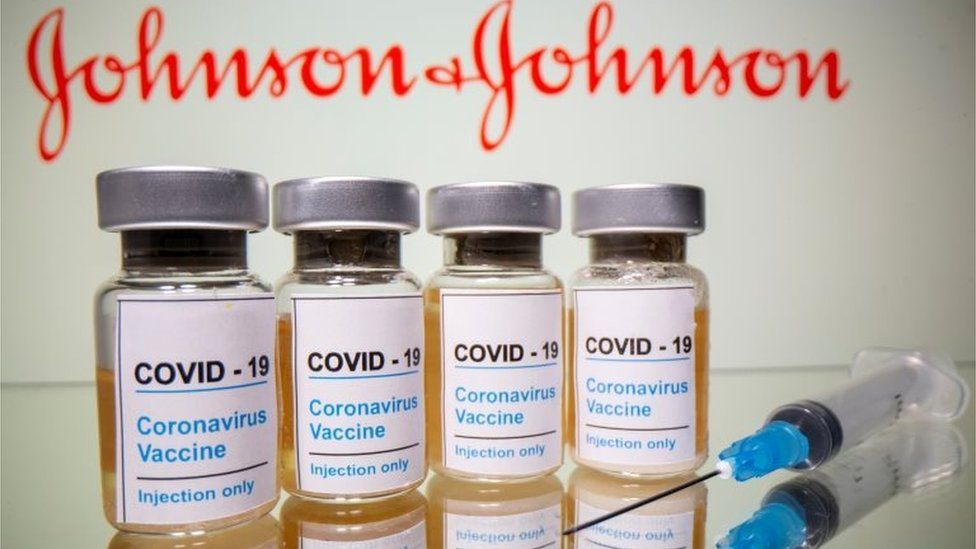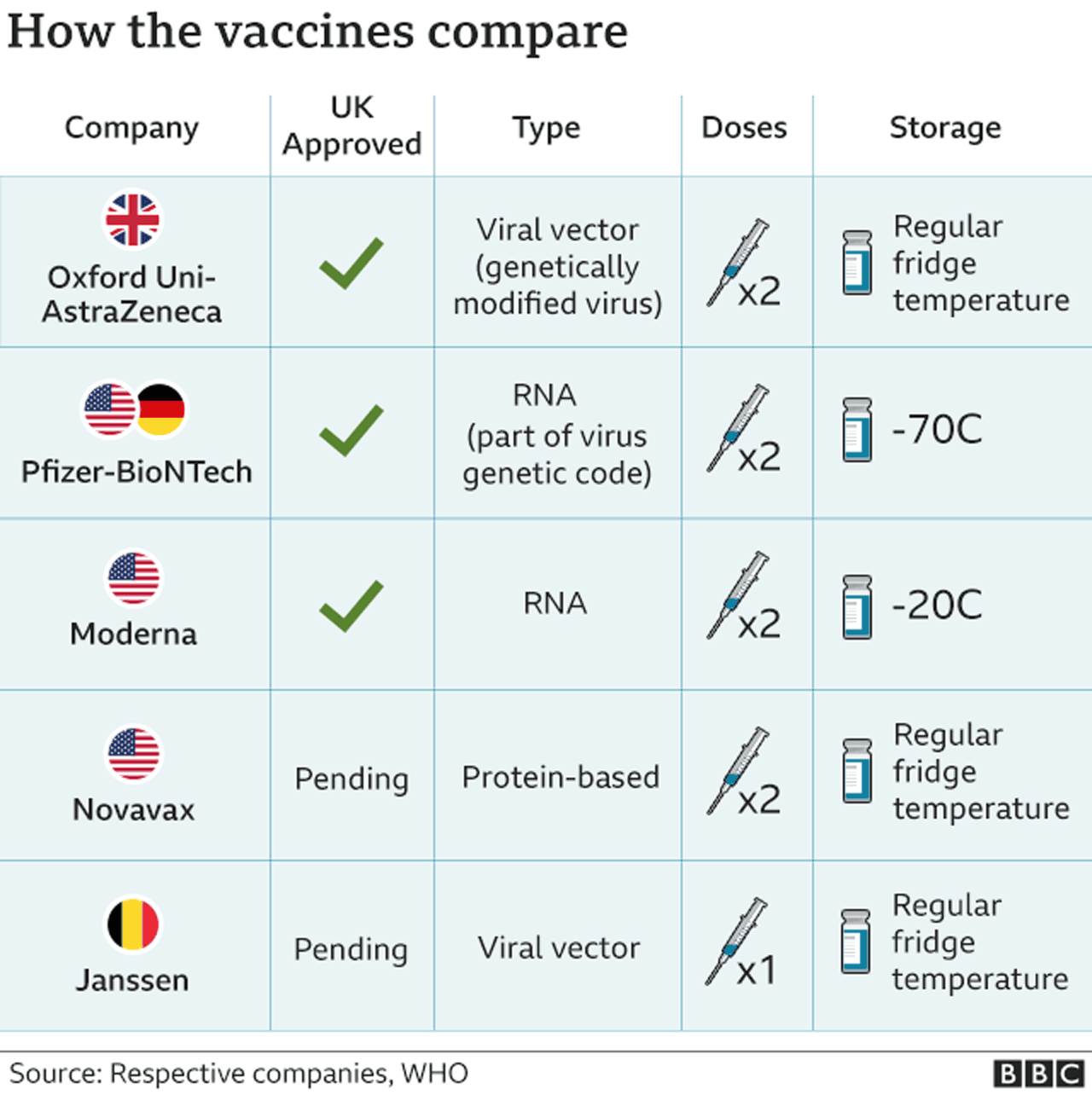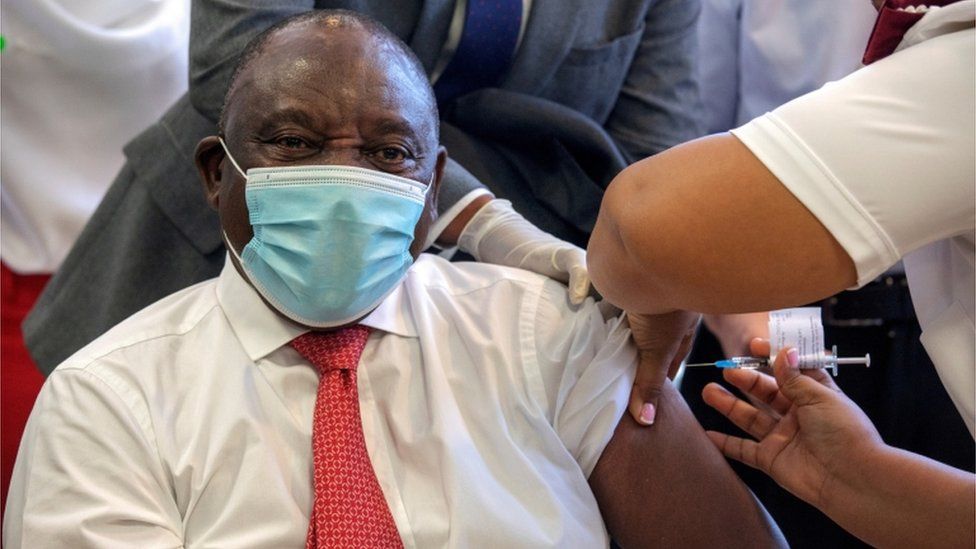Following rare blood clots, the company says it will also delay the vaccine rollout in Europe.

image copyrightReuters
US health authorities are calling for a pause in the use of the Johnson & Johnson Covid-19 vaccine, after reports of extremely rare blood clotting cases.
The Food and Drug Administration (FDA) said six cases in 6.8 million doses had been reported and it was acting “out of an abundance of caution”.
Following the news, South Africa, the first country to use the jab, said it would suspend its rollout.
Johnson & Johnson said it would also delay its vaccine drive in Europe.
The US move follows similar rare cases in the AstraZeneca vaccine, which has prompted some curbs in its use.
Dr Anthony Fauci, the top Covid adviser in the US, said it was too early to comment on whether the vaccine could have its authorisation revoked.
The US has by far the most confirmed cases of Covid-19 – more than 31 million – with more than 562,000 deaths, another world high.
The picture for the virus there is complicated, though, with some areas in the north seeing surges in infections, the south less, and with the figures not always reflecting inoculation numbers.
The Johnson & Johnson jab was approved in the US on 27 February and its use has been more limited so far than that of the Pfizer-BioNTech and Moderna doses.
Nevertheless, the government had hoped for hundreds of thousands of vaccinations of the jab every week. Unlike some of the other vaccines, it is dispensed as a single shot and is stored at common refrigerator temperatures, making it easier to distribute.
In South Africa, studies showed the Johnson & Johnson vaccine had a higher protection rate against the South African variant than other jabs, and since mid-February, nearly 300,000 healthcare workers have received it.
There have been no cases of blood clotting in South Africa, but as a precaution, the rollout has been temporarily suspended there, Health Minister Zweli Mkhize confirmed. The country has secured an additional 10 million Pfizer vaccines, he added.
The Johnson & Johnson vaccine is also known as the Janssen vaccine, named after the Belgian company that makes it.
The jab was approved by the European Union last month, and this week the first doses started arriving in the bloc. In a statement, the European Medicines Agency (EMA) said it is continuing with a safety review that began last week, but said there is no clear link between the vaccine and the blood clots.
The EU’s vaccine roll-out has been criticised by the WHO for being too slow, and and there are concerns this latest delay could throw it into further turmoil.
The Johnson & Johnson vaccine is yet to be approved in the UK, although 30 million doses are on pre-order. The Department of Health said the rollout delay would not affect vaccine supplies in the UK, or derail the aim to offer a jab to all adults by the end of July.
In a joint statement, the FDA and the Centers for Disease Control and Prevention (CDC) said they were “reviewing data involving six reported US cases of a rare and severe type of blood clot in individuals after receiving the J&J vaccine”.
It said the clotting was called cerebral venous sinus thrombosis (CVST).
The statement said that this type of blood clot needed a different treatment than usual.
The common treatment – an anticoagulant drug called heparin – “may be dangerous”, it said.
Pending a further review, the FDA and CDC recommended “a pause in the use of this vaccine out of an abundance of caution”.
This was to “ensure that the health care provider community is aware of the potential for these adverse events”.
All six cases were in women aged between 18 and 48, with symptoms appearing six to 13 days after vaccination.
One patient died from blood clotting complications, while another is in a critical condition, the FDA’s Peter Marks confirmed.
He added it was “plainly obvious” there were similarities with the rare blood clots experienced by a small number of people who received the AstraZeneca vaccine.
The joint statement said that “people who have received the J&J vaccine who develop severe headache, abdominal pain, leg pain, or shortness of breath within three weeks after vaccination should contact their health care provider”.
The US government is now likely to pause the use of the vaccine in all federally run vaccination sites, and to expect state sites to do the same.
Johnson & Johnson, a US health care company, issued a statement saying that safety was its “number one priority” and that it shared “all adverse event reports” with the health authorities.
It added: “We are aware that thromboembolic events including those with thrombocytopenia have been reported with Covid-19 vaccines. At present, no clear causal relationship has been established between these rare events and the Janssen (J&J) Covid-19 vaccine.”
It also said that it had been reviewing cases with European health authorities.
“We have made the decision to proactively delay the rollout of our vaccine in Europe,” it said.


By Rachel Schraer, BBC health reporter
The US health protection agency has identified a very small number of the same rare form of blood clots seen in people given the AstraZeneca jab.
Governments around the world have cautiously begun to link these rare blood clotting incidents to the vaccine because of their unusual presentation – though this link hasn’t been definitively proven.
People suffering them had very low platelet counts – blood cells that normally help repair damage in the body.
The Johnson & Johnson and AstraZeneca vaccines work in very similar ways. so in some respects it’s not surprising they may cause similar side effects. And these appear to be comparably rare.
The numbers we’re talking about are so low that it’s difficult to say confidently what the risk of fatal blood clots is, but for the AstraZeneca jab it has been estimated at one-in-a-million. There have been six cases out of 6.8 million doses of the Johnson & Johnson jab.
In contrast, Covid kills one in 1,000 infected in their 40s among those who develop symptoms (and this risk is much higher among older people).
Once you get into the youngest age groups, who are less likely to die from Covid, that risk calculus shifts, particularly when there aren’t too many infections in circulation.


image copyrightReuters